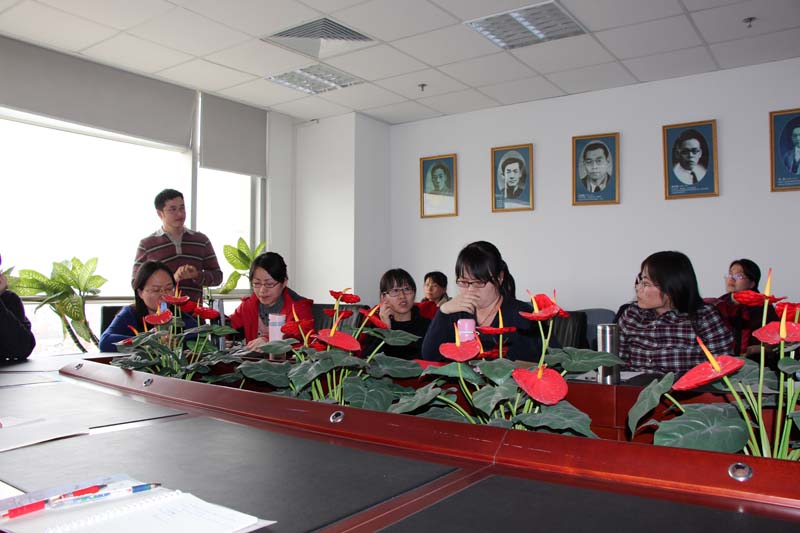
(第二期,2013年3月18日)
2013年3月18日下午,北京师范大学外文学院语言学沙龙在后主楼1020举行第二次活动。
本次沙龙的报告人是张冬冰同学,主题为An Appraisal Based Analysis of Personal Identity in Narrative:A Case of Santiago in The Old Man and the Sea。他主要向大家展示他的论文研究成果,运用评价理论对《老人与海》中的老人进行身份解读,分析也涉及社会语言学和功能语言学等方面的内容。研究结合Labov、Aristotle的理论,将整个小说分为七个阶段,并运用评价系统分析各个部分的态度意义,从评价、互动协商等角度解读老人在各个阶段体现的身份特征,最后提出一个未解决的问题:如果将Identity置于Martin提出的关于语言及其符号环境(即从音系层到意识形态)的层级分布中,应属于语域层中的语旨还是属于语篇语义层的评价系统?
随后,大家针对报告的内容展开了热烈的讨论。首先,对研究中涉及的一些概念存在争议:identity是如何定义的,为何不用personality;研究使用construe identity,与identity construction有何区别;negotiation在Martin的语篇语义学理论中是一个语篇系统,在研究中指通过对话的形式协商某种态度意义,容易引起混淆,等等。其次,研究中评价和身份建构的关系不太清楚。针对这一问题,彭老师指出,从评价出发挖掘文本深层次内容可以避免混乱。再次,苗老师提出了几个方法上面的问题:对小说进行分段的价值如何体现;对文学作品的分析可结合Halliday提出的突出或前景化(prominence/ foregrounding)概念,深层次挖掘作品内涵;对于身份的解读可在评价系统的基础上细化分类,并使之系统化。同时,苗老师还指出,语言研究要从语言事实出发,分析语言事实中潜在的结果。最后,大家又针对评价系统提出一些问题和看法。
本次沙龙十分成功,对大家都有很大帮助。一方面,报告人将自己的研究与大家分享,不仅能够意识到研究中存在的问题,还可以收到很多建设性的意见,有利于研究的改善;另一方面,报告促使大家不断思考,提出自己的问题和建议,在讨论中受到启发,有利于思路的开阔。
(刘玉洁 张冉冉 报道)
本次活动参加人员:召集人——张树堂
白剑韬,白丽娜,解敏,解淑媛,鞠志勤,李传明,李兆娜,刘玉洁,苗兴伟,彭宣维,齐豪杰,任双,唐娇梅,王天鸽,王晓婷,卫昭慧,于晖,于爽,张静,张妮,张冬冰,张敬肖,张冉冉,张树堂,张玉凤,赵倩莹,郑琦,周婵,周今由
附:张冬冰讲座摘要
An Appraisal Based Analysis of Personal Identity in Narrative
—The case of Santiago in The Old Man and the Sea
Abstract
Identity has been one of the most important topics in the study of sociolinguistics, sociology and anthropology. Linguistically speaking, the previous researches on identity in narrative mainly concern the narrator’s construction of self identity through narrative. As far as systemic functional linguistics inquiry into identity is concerned, the main data for the researches include university flyers, history textbooks, workplace email interactions, academic and forensic discourse. The closest relevant study is the analysis of casual conversation, along the way of the speakers’ construction of their identities through narration. The present research uses the rich repertoire of systemic functional model, namelyAPPRAISALsystem to analyze personal identity based on the case of Santiago (the old man) in The Old Man and the Sea.
The thesis aims to unravel the character’s constructed personal identity through the analysis of the APPRAISALmeanings. It also analyzes the ways the relevant APPRAISALresources function to construe those identities and the patterns of the character’s personal identities in relation to the phase of development.
The annotatedAPPRAISALtext is taken from theAPPRAISALCorpus developed by the Centre for Functional Linguistics at Beijing Normal University. The text is analyzed in terms of the APPRAISERSof the APPRAISALmeanings and the way APPRAISALresources are negotiated in conversation. Furthermore, the ways different characters are affiliated are also discussed in relation to Santiago’s personal identities.
The thesis argues for Santiago’s tenacious, experienced, confident, optimistic, dependable and righteous personal identities. The recognition of such qualities as personal identities is based on the criterion postulated by Tracy (2002) and the definitions from the Collins Cobuild Dictionary (1987). Santiago’s personal identities are constructed in the following ways. 1) From the sources of APPRAISAL, Santiago’s personal identities are constructed through ①narrator’s, Santiago’s and Manolin’s (Santiago’s apprentice) evaluation of Santiago, ②Narrator’s evaluation of the great fish and ③Santiago’s evaluation of the great fish. 2) From the negotiation of APPRAISALin conversations, Santiago’s identities are construed through ①his adjustment of Manolin’s evaluation of people and things and through ②his negotiation of evaluation with himself in terms of his own action. 3) APPRAISALmeanings are argued to have affiliated Santiago with the great fish and distanced Santiago from the sharks. Such affiliation and distancing involve the change and contrast of AFFECT and GRADUATION, and positive and negative JUDGMENTand APPRECIATION. Affiliation is also construed through the similar evaluation of Santiago and the great fish.
As far as the patterns of Santiago’s personal identities are concerned, 1) Most of Santiago’s identities are constructed at the beginning of the text (Orientation phase) and consolidated through the following phases; 2) two of Santiago’s personal identities are given prominence, hence foregrounded, through recurrent construction (i.e. tenacious and experienced). It is argued that these two identities are central to Santiago’s victory against nature.
Furthermore, it is believed that the present research covers both interstratal (realisation) and intrastratal (instantiation) speculation on identity construction and suggests to have implications for the analysis and teaching of narrative text.
Key words: personal identity, identity construction, narrative,APPRAISALresources
基于评价意义系统的个人身份建构
——《老人与海》中的主角圣地亚哥分析
摘要
身份研究在社会语言学、社会学和人类学的研究中得到了广泛的关注。在语言学的研究中,之前的研究主要集中在人们通过叙述构建身份的方法及通过叙述在不同的情境中构建的不同身份。从系统功能语言学的角度研究身份主要集中在大学宣传册、历史教科书、同事之间电子邮件交流以及学术和法律语篇上。同本研究最相关的是对日常会话的研究,但研究对象为叙述者本身的身份建构。在系统功能语言学范畴内评价系统的基础上,以小说《老人与海》中圣地亚哥为个案,本论文主要分析叙述文本内人物个人身份的建构。
首先,本论文旨在分析小说中所构建人物的个人身份。其次,本文试图探讨不同评价意义在人物身份构建过程中起到的作用。最后,本文试图分析人物身份构建的模式同小说不同发展阶段之间的关系。
文中分析的语料标注来源为北京师范大学系统功能语言学中心研发的评价语料库。评价成分的分析主要分为三个方面:一、评价成分的来源(评价者);二、小说人物对话中评价意义的交流;三、小说人物之间的亲疏关系。
对小说文本中评价意义的分析表明,圣地亚哥的跟人身份在小说中被塑造为有耐力、有经验、自信、乐观、可靠和正直。这些品质被认为是个人身份的主要依据为Tracy(2002)对个人身份的界定和Collins Cobuild Dictionary(1987)中对这些词的定义。文本对圣地亚哥个人身份的建构主要有三方面:1)从评价者的角度,圣地亚哥的身份通过①叙述者、圣地亚哥和马诺林(圣地亚哥的学徒)对圣地亚哥的评价,②叙述者对大鱼的评价以及③圣地亚哥对大鱼的评价构建。2)从角色对话中对事物评价交流的角度,圣地亚哥的身份主要从以下两方面建构①圣地亚哥关于马诺林对人和事物评价的指正;②圣地亚哥对自己行为的评价。3)情感意义与极差意义的变化和对比,以及判断和鉴赏成分极性的不同将老人同大鱼结盟为一个团体。此外,对于圣地亚哥和大鱼类似的评价加深了二者之间的结盟关系。
此外,圣地亚哥身份的建构特点包括:1)圣地亚哥绝大多数的个人身份的建构在叙事的引入阶段;2)圣地亚哥的两个个人身份通过反复构建得以突显(即有耐力和有经验)。本文认为,圣地亚哥的这两种身份对于他战胜自然起到关键作用。
本文对小说人物个人身份建构的研究既涉及层次间(体现)的探讨,也涉及层次内部(实体化)的探讨。研究方法、角度与结果对于叙事体文本的分析与教学有一定的借鉴意义。
关键词:个人身份,身份建构,叙事,评价资源


